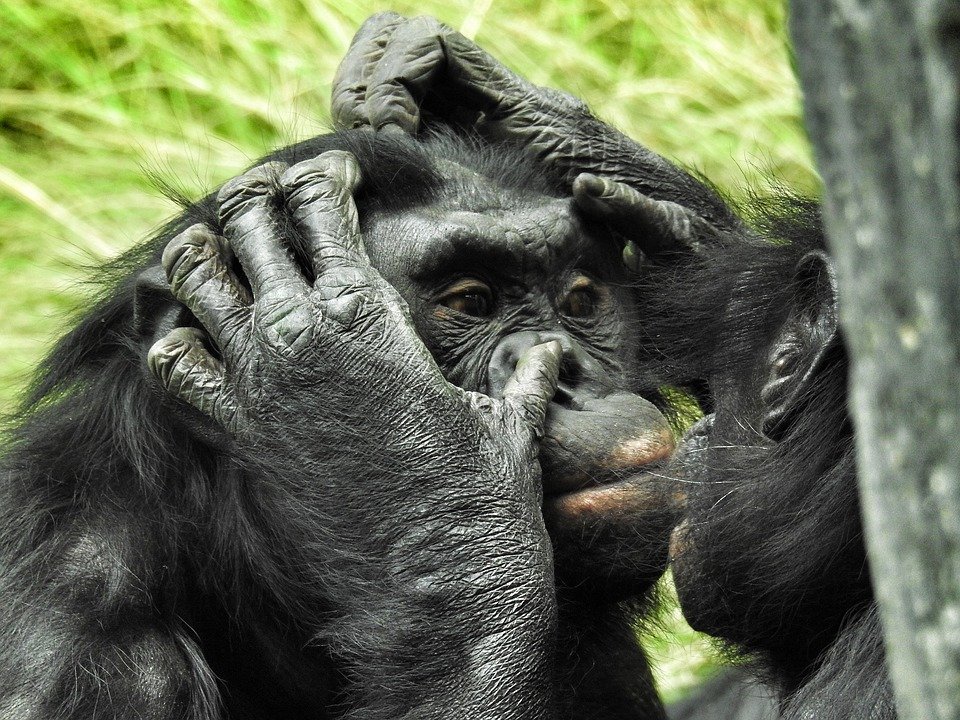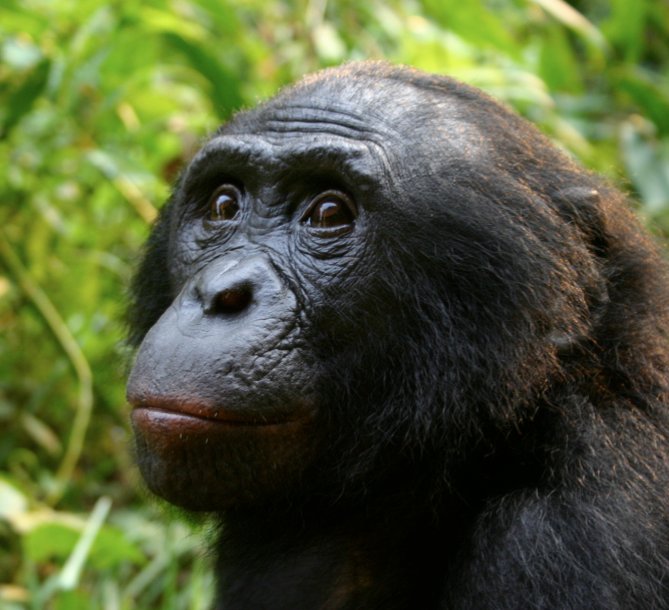In the heart of the lush rainforests of the Congo Basin in Central Africa, resides a species that shares a remarkable 98.7% of its DNA with humans: the bonobo (Pan paniscus). Often overshadowed by their more widely recognized cousins, the chimpanzees, bonobos are a species deserving of attention in their own right. These gentle apes offer invaluable insights into the evolutionary journey of primates and, consequently, our own human story.
Bonobos are primarily found in the Democratic Republic of Congo, in the southern part of the Congo River. This geographical isolation from chimpanzees has led to their distinct evolutionary path. The region’s dense forests provide the perfect habitat for these arboreal apes, who spend a significant amount of time in the treetops, foraging for food and seeking refuge from predators.
Peaceful Peacemakers
A defining trait of bonobos is their peaceful and matriarchal social structure. Unlike the male-dominated society of chimpanzees, bonobo communities are led by females, and social harmony is maintained through cooperation and sexual behaviors. Conflicts are typically resolved through non-aggressive means, and sexual interactions serve as a form of communication and social bonding.
Lovers of Love
 Bonobos are referred to as the “make love, not war” primates. Sexual behavior is central to their society and extends beyond reproduction. Bonobos use sex to diffuse tension, form alliances, and even as a greeting. This behavior involves all members of the group, irrespective of age or sex, showcasing the fluid and complex social dynamics within bonobo communities.
Bonobos are referred to as the “make love, not war” primates. Sexual behavior is central to their society and extends beyond reproduction. Bonobos use sex to diffuse tension, form alliances, and even as a greeting. This behavior involves all members of the group, irrespective of age or sex, showcasing the fluid and complex social dynamics within bonobo communities.
A Diverse Diet
These omnivorous apes have a varied diet comprising fruits, leaves, flowers, bark, and small animals. Their foraging habits are highly social, often involving coordinated group efforts to find and share food. This sharing behavior further strengthens social bonds within the group and ensures that all members receive adequate nourishment.
Intelligence and Empathy
Bonobos are highly intelligent and exhibit behaviors indicating a deep capacity for empathy. They have been observed using tools like sticks to extract insects from holes and demonstrating problem-solving abilities in captivity. Their empathetic nature is evident in their care for sick or injured group members and their tendency to comfort each other during stressful times.
Conservation Challenges
Despite their intriguing behaviors and close genetic ties to humans, bonobos face significant threats in the wild. Habitat destruction due to logging agriculture and hunting for bushmeat has severely impacted their populations. Conservation efforts are crucial to ensuring the survival of these remarkable apes. Organizations and researchers are working tirelessly to protect bonobos and their habitats, raising awareness about preserving this unique species.
Social Structure and Communication
Bonobo society is characterized by strong social bonds and a high degree of cooperation. Female bonobos often form coalitions that help them maintain dominance over males. These coalitions are built on trust and reciprocal relationships. Communication among bonobos is complex and includes a variety of vocalizations, facial expressions, and gestures. They are known for their distinctive “laugh” when playing or socializing, which is a testament to their playful and affectionate nature.
Bonobos in Popular Culture
While not as widely recognized as chimpanzees, bonobos have captured the imagination of scientists and animal lovers alike. They have been featured in documentaries, books, and research studies highlighting their unique behaviors and the pressing need for conservation. Bonobos serve as ambassadors for their ecosystems, bringing attention to the broader environmental issues facing the Congo Basin.
Bonobos remind us of the incredible diversity of life on Earth and the intricate connections that bind us to our primate relatives. Their peaceful and cooperative nature offers a glimpse into an alternative evolutionary path that emphasizes the power of love and empathy. By understanding and protecting bonobos, we safeguard a species and enrich our understanding of what it means to be human. As we continue to unravel the mysteries of bonobos, we gain a deeper appreciation for the natural world and our place within it.

